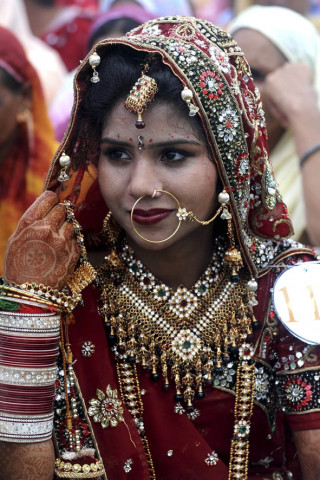Muslim women can pronounce triple talaq: Indian seminary
Ruling comes in the wake of the practice being challenged by an Indian Muslim woman

An Indian bride sits during a mass marriage ceremony for some 121 low-income couples in an area on the outskirts of Amritsar. PHOTO: AFP
The edict or fatwa, issued by the renowned Dargah Ala Hazrat (Bareilly) which represents the Barelvi sect, comes in backdrop of the controversial practice being challenged by a Muslim woman, Ishrat Jahan, who was divorced by her husband during a phone call from Dubai. She had filed a plea in India’s Supreme Court, challenging the Muslim practice of polygamy.
"Muslim women have the right to divorce themselves in certain circumstances where they no longer wish to continue in the marriage. It is provided for in Islamic law. But an agreement for the same has to be made at the time of nikah. It can be oral or written," spokesperson for the seminary, Mufti Mohammed Salim Noori, said.
The 26-year-old woman has sought a declaration from the top court that Section 2 of Muslim Personal Law (Shariat) Application Act, 1937 was unconstitutional as it violated fundamental rights guaranteed under Articles 14 (equality), 15 (non-discrimination), 21 (life) and 25 (religion) of the Constitution “in so far as it seeks to recognise and validate talaq-e-bidat (triple talaq) as a valid form of divorce”.
India's Muslim women fight 'triple talaq' divorce
The Indian apex court had in June agreed to examine the issue, saying triple talaq among the Muslim community was a “very important matter affecting a large section of people”, which had to be tested on the “touchstone of the constitutional framework”. The All India Muslim Personal Law Board and Jamiat-e-Ulema had defended triple talaq and said it was part of Quran-dictated personal law which was beyond the ambit of judicial scrutiny.
India’s religious minorities, including its 155 million Muslims, are governed by personal laws that are meant to enshrine their religious freedom in Hindu-majority India. But women say the Muslim Personal Law Application Act, which is based on Sharia law and permits triple talaq, is being misused, allowing men to instantly walk away from families.
Many Muslim majority countries including Bangladesh have already banned it, while legislation on the same is pending in Pakistan. But, India’s Muslim leaders are reluctant to amend the personal law, fearing an erosion of their religious identity. Some fear Hindu hardliners will use such changes as an excuse to push for the law’s entire abolition.
The Holy Quran prescribes a procedure for divorce to be undertaken in 90 days, starting from the first utterance of talaq, followed by two more but with a 30-day gap in between each one. Islamic scholars say this gives couples time to reflect on their marriage and possibly reconcile. Most Muslim scholars say instant talaq diverts from the Holy Quran. Although it was given official approval during the rein of Islam’s second caliph Omar in the seventh century, it was discouraged.
This article originally appeared on Deccan Chronicle.



















COMMENTS
Comments are moderated and generally will be posted if they are on-topic and not abusive.
For more information, please see our Comments FAQ